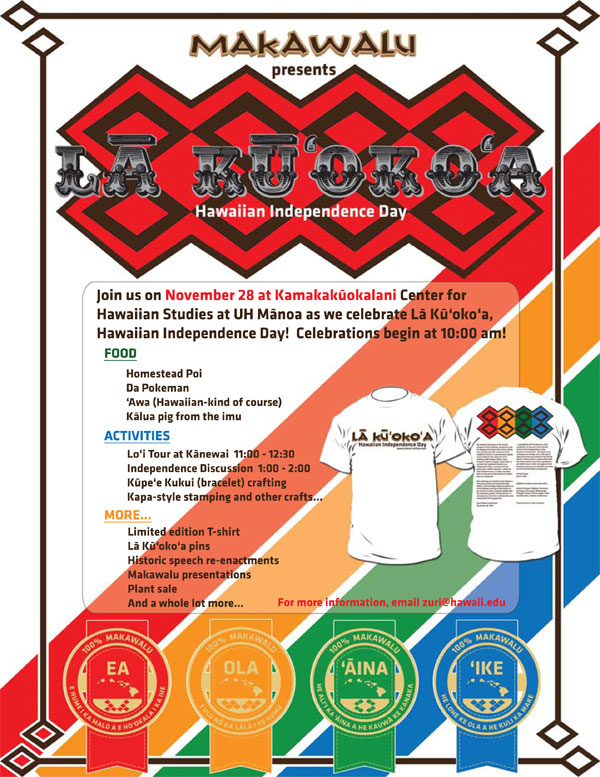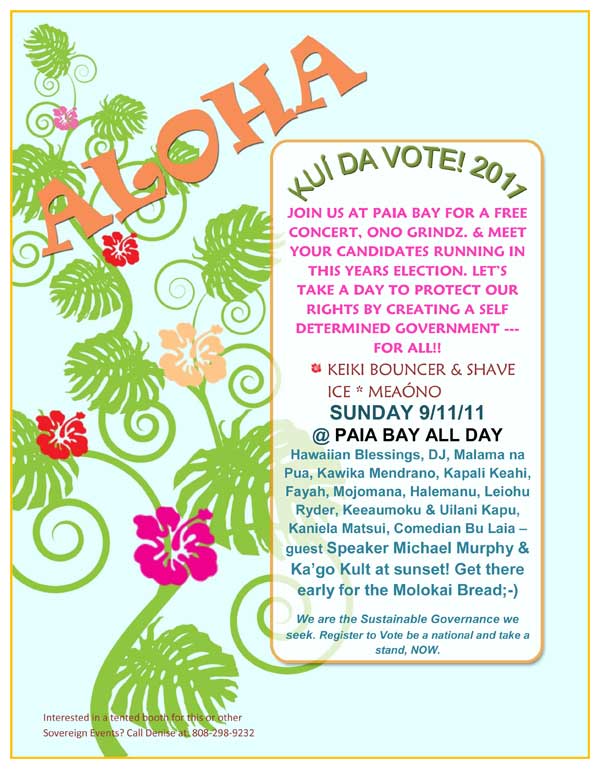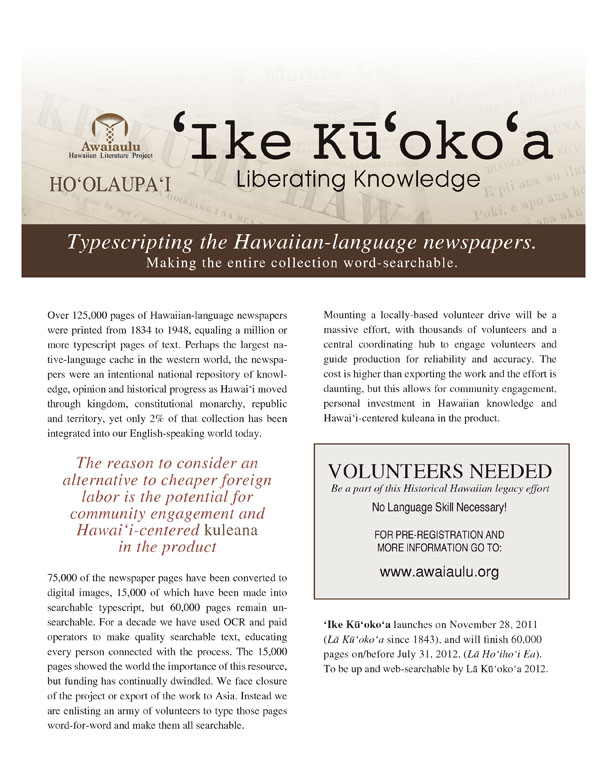This blog is about Hawaii's status as an independent country under prolonged illegal occupation by the United States, and the history, culture, law & politics of the islands.
By Scott Crawford, Hana, Maui
|
Blogs.com Top 10
Hawaii Blogs |
|
Maui News reports:
Office of Hawaiian Affairs officials presented a proposed settlement to Native Hawaiians on Friday night in which the agency would receive $200 million in Honolulu real estate for revenue generated on Hawaiian monarchy lands.
But some of the approximately 50 people who attended the meeting at Maui Waena Intermediate School reacted with anger and distrust of OHA negotiating a deal with the state.
During a question-and-answer session, Foster Ampong said that having OHA, a state agency, negotiate with the state is like “a thief negotiating with itself.”
From Leon Siu…

Ke Aupuni Update
November 27, 2011
Keeping in touch and updated on activities regarding the restoration of Ke Aupuni o Hawaii, the Hawaiian Kingdom. Ua mau ke ea o ka aina I ka pono.
Celebrate Hawaiian Independence Day
Makawalu presents
Lā Kū’oko’a
Tomorrow, November 28, 2011 10am-2pm
at Kamakakūokalani Center for Hawaiian Studies
UH Mānoa
WHAT IS Lä KŪ’oko’a?
In the Kingdom of Hawai’i, November 28 was an official holiday called Lā Kū‘oko‘a, or Independence Day. This was the day in 1843 when England and France formally recognized Hawai’i’s independence.
Faced with the problem of foreign encroachment of Hawaiian territory, His Majesty King Kamehameha III deemed it prudent and necessary to dispatch a Hawaiian delegation to the United States and then to Europe, with the power to negotiate treaties and to ultimately secure the recognition of Hawaiian Independence by the major powers of the world.
From: Puakea Nogelmeier [mailto:puakea@hawaii.edu]
Sent: Wednesday, November 23, 2011 1:28 AM
Subject: ‘Ike Ku’oko’a
Aloha no,
I am hoping that you’ve already heard noise about ‘Ike Ku’oko’a, the Hawaiian newspaper initiative, and if so, here’s an update. On Monday, Nov. 28th, we (kakou) launch an ambitious volunteer effort to typescript the 60,000 remaining pages of Hawaiian-language newspapers, finally making all the available pages searchable. La Ku’oko’a (Nov. 28) seems to be the perfect time to begin, and July 31, La Ho’iho’i Ea, a good time to end. It will take 200,000 volunteer hours, just over 3 hours per page, to get the job done, but compare that to the ten years dedicated to getting the first 15,000 up on the web.
That decade of work highlighted the importance of these newspapers, and now there’s an enthusiastic response from here in the islands and places afar, with Hawaiians and supporters of Hawaiian culture and history stepping up to make something wonderful happen – together. No language skill necessary, so everyone can participate. By La Ku’oko’a of next year all 75,000 pages of Hawaiian newspapers that have been found so far (of more than 125,000 pages printed) will be up and searchable – all at once. Initiated by Awaiaulu and carried out by thousands, near and far, it’ll be a remarkable success and a historic effort. Please be a part of it. Log on and learn more at www.awaiaulu.org – and share the idea with others.
Star-Advertiser reports that
The state and Office of Hawaiian Affairs are in discussions on an agreement to settle past due amounts owed to OHA from ceded lands payments.
The agreement, which would be subject to public meetings and legislative approval, would involve the state offering land in Kakaako to OHA.
[…]
Under terms of the settlement, the state and OHA would agree that $200 million represents a reasonable compromise to settle disputed claims, the governor’s office said in a news release. To satisfy the $200 million claim, the state is conveying “contiguous and adjacent parcels in Kakaako Makai” near Waterfront Park, including Fisherman’s Wharf. […]
In exchange, OHA will “release, waive and discharge and and all claims that it, and any other person or entity, might make to ceded lands receipts,” the news release said.
Larry Geller at Disappear News blog makes some interesting observations, noting that “The property appears to be all, or almost all, in the tsunami inundation zone,” and that “…the state is once again proposing to give substandard land in settlement of Native Hawaiian claims.”
But the larger issue I’d like to remind folks of is that “ceded” lands is a complete misnomer and historical falsehood.
The “Annexation” of Hawaii and the Origin of “Ceded” Lands
Cession: the formal giving up of rights, property, or territory, esp. by a state
Cede: give up (power or territory)
The following clauses from United States Public Law 103-150 (the Apology Resolution, Nov. 23, 1993) describe the origin of the so-called “ceded” lands:
Whereas, through the Newlands Resolution, the self-declared Republic of Hawaii ceded sovereignty over the Hawaiian Islands to the United States; Whereas, the Republic of Hawaii also ceded 1,800,000 acres of crown, government and public lands of the Kingdom of Hawaii, without the consent of or compensation to the Native Hawaiian people of Hawaii or their sovereign government
No consent and no compensation = didn’t ask, didn’t pay = stole
A letter dated March 12, 1898, the year of purported annexation, from United States Senator Caffrey stated:
“The present government of Hawaii, which undertakes to cede territory to the United States, has no title to the island, for the reason that their title is derived from the revolution instigated and carried to consumation by the United States Minister, Mr. Stevens. The revolutionists are not the representatives of the wishes of the people of Hawaii, and can convey no title to the sovereignty of territory, the control of which they have usurped.”
There was never a legitimate, legal cession, and there really is no such thing as “ceded lands.” No land or sovereignty of Hawai`i was ever legally ceded to the United States.
Only a treaty can legally affect cession or annexation of territory, and no treaty of annexation was ever ratified for Hawai`i. The United States Congress, in it’s military eagerness in the midst of the Spanish-American War, and as an extension of the Manifest Destiny philosophy beyond the American Continent, passed a unilateral joint resolution of annexation and in effect stole Hawai`i, in blatant violation of the U.S. Constitution and international principles and laws.
This is the basis of the state of Hawai`i’s claim to these lands, and the United States’ claim to the entire archipelago. (For information on why the statehood process was invalid, see Is Hawaii Really a State of the Union?.) These so-called “ceded” lands have for decades been leased to various non-Hawaiian and foreign entities with virtually no benefit to the Native Hawaiian People.
In 1978 the Office of Hawaiian Affairs (OHA) was created in a state Constitutional Convention, to receive 20% of revenues from so-called ceded lands to benefit the Native Hawaiians. OHA has provided some beneficial programs for the Hawaiian people and land, but has also been criticized for ineffective management of funds. But OHA is itself a creation and part of the state government, so settling a claim between OHA and the state over so-called ceded lands is the state negotiating with itself over land that it has no legitimate title to in the first place.
These lands do not belong to the de facto state, they belong to the Hawaiian national population, and the further disenfrachisement of their birthright is just further perpetuation of the injustices which are acknowledged in the Apology Resolution, traced all the way back to the illegal 1893 intervention and 1898 start of the prolonged illegal occupation, the tangible impacts of which very much persist to this day.
Sorry I’ve been missing in action for a while there, I had some trouble with the host where my wordpress blog is located and I couldn’t add any new posts, but it appears to be straightened out again. So stay tuned, posts will continue….
Check out this essay from Keanu in Hawaii News Daily, in response to Ken Conklin. Read if you want to understand where Keanu is coming from, and why Conklin has no qualified expertise in Hawaiian political science.

Promotional Sovereign Vote Event
Sunday, Sept 11, 10am-6pm FREE
Paia Bay Park
Continue reading Kui Da Vote benefit concert in Paia
Gov. Appoints 5 To Hawaiian Roll Commission
Commission To Create Qualified List Of Participants
POSTED: 12:51 pm HST September 8, 2011
HONOLULU — Gov. Neil Abercrombie on Thursday announced his choices for the Native Hawaiian Roll Commission.
The commission is made up of five members of the Native Hawaiian community.
They are:
1. former Gov. John D. Waihee;
2. ‘Oiwi TV executive director and documentary film director Naalehu Anthony;
3. attorney Lei Kihoi, who has helped shape Hawaiian rights legislation;
4. former Native Hawaiian Legal Corporation Executive Director Mahealani Perez-Wendt;
5. and Council for Native Hawaiian Advancement President and Chief Executive Officer Robin Puanani Danner.
The commission has been directed to create a roll of qualified Native Hawaiians defined by state law to participate in the formation of a Native Hawaiian government.
“These individuals represent various sectors of the Hawaiian community. Each brings experience, talent, knowledge, and skills that collectively create a broad-based team,” Abercrombie said. “This team will put together the roll of qualified and interested Native Hawaiians who want to help determine the course of Hawaii’s indigenous people.”
The delegates represent the four counties and one at-large seat: Waihee (At-Large), Kihoi (Hawaii), Perez-Wendt (Maui), Anthony (Oahu) and Danner (Kauai). Waihee will be the commission chairman
Read more: http://www.kitv.com/politics/29124166/detail.html#ixzz1XPcpmMgL
20th Anniversary
Stopping the Bombing of Kahoʻolawe
The Protect Kahoʻolawe ʻOhana
P.O. Box 39 Kaunakakai, HI 96748
Aloha Aina Oiaio! Two great events next week. Free and open to the public. Please share. see attachment. Mahalo Kaleikoa
The Protect Kahoolawe Ohana (PKO) is celebrating its 20th Anniversary of Stopping the Bombing on the island of Kanaloa-Kahoolawe with events on each island that are free and open to the public. Mission of PKO is to perpetuate Aloha Aina throughout our islands through cultural, educational, and spiritual activities that heal and revitalize the cultural and natural resources of Kahoolawe.
The yearlong events will culminate on October 22, 2011 with the dedication o fa new mua (monument) at Honokanaia on Kanaloa-Kahoolawe and a central ceremony with the Kanoa that will have gathered the mana (strength), support of participants and sacred sites throughout our islands.
Thursday Sept 8 2011 6:30 pm
Student Lounge, Pilina Building
UH Maui College
SPEAKERS, MUSIC, POETRY
FILM: “MAI KA PIKO MAI, A HOI:
RETURN TO KANALOA”
The parallel stories of struggle to free Kahoolawe from the U.S.
Military and the challenge of re-establishing inter-Polynesian
voyaging by the Polynesian Voyaging society through Hokulea
Sponsored by the PKO & Hawaiian Studies & Language, UHMC
Saturday Sept 10 2011
4:30pm to 9:30pm
Hawaiian Canoe Club, Kahului Harbor
Music & Entertainment
Poetry | Film: “Mai Ka Piko Mai, A Ho!i: Return to
Kanaloa” | ”All our Aloha in One Kanoa Uniting”
in a commitment to Aloha aina and Kanaloa-
Kaho!olawe | Silent auction and fundraising |
!Ono Food and drinks
Sponsored by the PKO & Hawaiian Canoe Club
Call Lopaka Aiwohi at (808) 242-5888 for more information and/or donations.
Mahalo a nui loa
Aloha Aina Oiaio!
David Keanu Sai, Ph.D. will be presenting his new book, Ua Mau Ke Ea–An overview of the Political and Legal History of the Hawaiian Islands.
FREE–Public is invited
Monday, August 29, 2011
6 PM, UH Maui College
Student Lounge, Pilina Building
Sponsored by Hawaiian Language and Hawaiian Studies Department of UH Maui College
PDF Flyer
|
Support If you find this weblog valuable, please consider making a secure donation via PayPal to support its ongoing maintenance:
Or about sponsoring this blog in exchange for a Sponsor Link spot in this sidebar.
|




